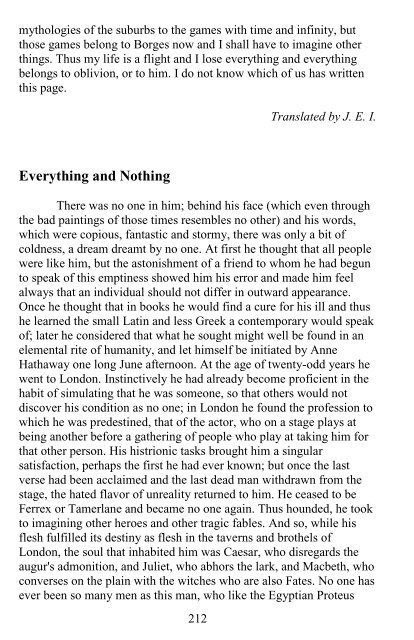Jorge Luis Borges - Labyrinths
Jorge Luis Borges - Labyrinths
Jorge Luis Borges - Labyrinths
You also want an ePaper? Increase the reach of your titles
YUMPU automatically turns print PDFs into web optimized ePapers that Google loves.
mythologies of the suburbs to the games with time and infinity, but<br />
those games belong to <strong>Borges</strong> now and I shall have to imagine other<br />
things. Thus my life is a flight and I lose everything and everything<br />
belongs to oblivion, or to him. I do not know which of us has written<br />
this page.<br />
Translated by J. E. I.<br />
Everything and Nothing<br />
There was no one in him; behind his face (which even through<br />
the bad paintings of those times resembles no other) and his words,<br />
which were copious, fantastic and stormy, there was only a bit of<br />
coldness, a dream dreamt by no one. At first he thought that all people<br />
were like him, but the astonishment of a friend to whom he had begun<br />
to speak of this emptiness showed him his error and made him feel<br />
always that an individual should not differ in outward appearance.<br />
Once he thought that in books he would find a cure for his ill and thus<br />
he learned the small Latin and less Greek a contemporary would speak<br />
of; later he considered that what he sought might well be found in an<br />
elemental rite of humanity, and let himself be initiated by Anne<br />
Hathaway one long June afternoon. At the age of twenty-odd years he<br />
went to London. Instinctively he had already become proficient in the<br />
habit of simulating that he was someone, so that others would not<br />
discover his condition as no one; in London he found the profession to<br />
which he was predestined, that of the actor, who on a stage plays at<br />
being another before a gathering of people who play at taking him for<br />
that other person. His histrionic tasks brought him a singular<br />
satisfaction, perhaps the first he had ever known; but once the last<br />
verse had been acclaimed and the last dead man withdrawn from the<br />
stage, the hated flavor of unreality returned to him. He ceased to be<br />
Ferrex or Tamerlane and became no one again. Thus hounded, he took<br />
to imagining other heroes and other tragic fables. And so, while his<br />
flesh fulfilled its destiny as flesh in the taverns and brothels of<br />
London, the soul that inhabited him was Caesar, who disregards the<br />
augur's admonition, and Juliet, who abhors the lark, and Macbeth, who<br />
converses on the plain with the witches who are also Fates. No one has<br />
ever been so many men as this man, who like the Egyptian Proteus<br />
212


